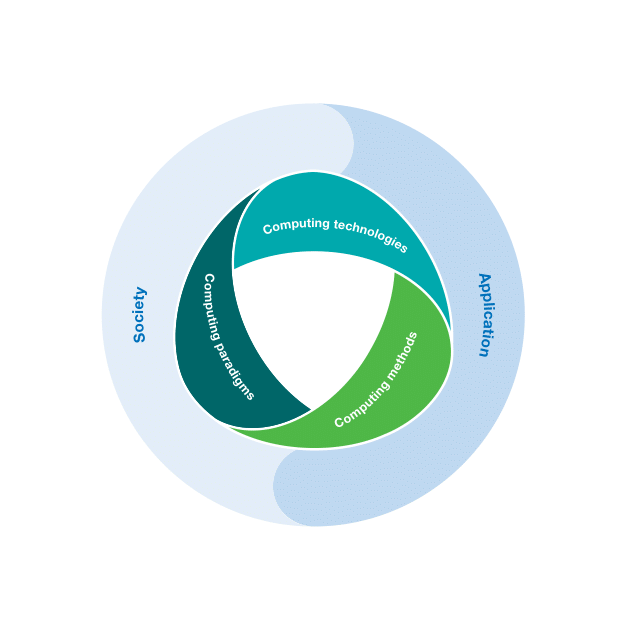
Next Generation Computing at RWTH Aachen University
Scientists all over the world are researching major global challenges such as climate change, healthcare, energy and mobility transformation. To develop solutions with the help of big data and artificial intelligence, the current computing structures based on the Von Neumann architecture, which was developed in 1945, are reaching their limits. To move forward, more powerful and energy-efficient computers are needed. They require new materials, technologies, methods, hardware and software that are characterized by speed, miniaturization, performance, trustworthiness and resource efficiency.
RWTH Aachen University (RWTH) is working to understand computing principles, translate them into engineering systems for specific applications and achieve technological sovereignty. The RWTH vision of “Next Generation Computing” looks at this technological aspect in a larger context and considers societal and sustainability issues of computing:
We envision a world transformed by next generation computing and enable it by sustainable and responsible technologies, paradigms and methods.
The technological part of Next Generation Computing at RWTH consists of three structure-building areas: CMOS and more (innovative nanoelectronics, computer chip design and fabrication), Quantum Computing (materials, hardware and software, quantum computing and quantum communication algorithms) and Neuromorphic Computing (hardware and software design based on the principles of biological brains). All of these are already supported by collaborative research projects, some of which are large-scale.
Collaborations between technoscientific disciplines in the areas of CMOS, Quantum Computing, and Neuromorphic Computing are well established at RWTH. However, the societal contexts of research and development (R&D) have only recently come into focus. Interdisciplinary projects are emerging to bring economists, ethicists, and sociologists together with technoscientific teams in order to open up ‘reflexive spaces’. These spaces allow researchers and technology developers to consider the economic, ethical, environmental, and social implications of their work. By embedding technological research in societal contexts, RWTH is taking an integrative interdisciplinary approach to realizing the vision of Next Generation Computing.
The digital landscape of Next Generation Computing at RWTH provides a quick overview of the various activities, projects and groups at RWTH that contribute to the topic of Next Generation Computing. Entries may include research projects and other opportunities for participation. To facilitate orientation, various filters can be used to search for projects from specific organizational units, e.g. a faculty, or on specific topics. There is no claim to completeness.